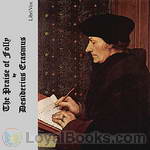|
Books Should Be Free Loyal Books Free Public Domain Audiobooks & eBook Downloads |
|
|
Books Should Be Free Loyal Books Free Public Domain Audiobooks & eBook Downloads |
|
Philosophy Books |
|---|
|
Book type:
Sort by:
View by:
|
By: Desiderius Erasmus (1466/69-1536) | |
|---|---|
 The Praise of Folly
The Praise of Folly
The Praise of Folly (Greek title: Morias Enkomion (Μωρίας Εγκώμιον), Latin: Stultitiae Laus, sometimes translated as In Praise of Folly, Dutch title: Lof der Zotheid) is a satirical essay written in 1509 by Desiderius Erasmus of Rotterdam (1466/69-1536). It is considered one of the most influential works of literature in Western civilization and one of the catalysts of the Protestant Reformation.It starts off with a satirical learned encomium after the manner of the Greek satirist... | |
By: Edgar Thurston (1855-1935) | |
|---|---|
 Omens and Superstitions of Southern India
Omens and Superstitions of Southern India
This book deals mainly with some aspects of what may be termed the psychical life of the inhabitants of the Madras Presidency, and the Native States of Travancore and Cochin. | |
By: Edith B. Lowry (1878-1945) | |
|---|---|
 Herself Talks with Women Concerning Themselves
Herself Talks with Women Concerning Themselves
| |
By: Edith B. Ordway (1877-) | |
|---|---|
 The Etiquette of To-day
The Etiquette of To-day
| |
By: Edmund Gosse (1849-1928) | |
|---|---|
 Three French Moralists and The Gallantry of France
Three French Moralists and The Gallantry of France
| |
By: Edna Lyall (1857-1903) | |
|---|---|
 The Autobiography of a Slander
The Autobiography of a Slander
The Autobiography of a Slander exposes the consequences of reckless words or, even worse, intentionally disparaging words. In this moral tale, told from the point of view of "the slander", Edna Lyall (pseudonym used by Ada Ellen Bayley) reveals her ideals and goals in life and relationships. | |
By: Edouard Louis Emmanuel Julien Le Roy (1870-1954) | |
|---|---|
 A New Philosophy: Henri Bergson
A New Philosophy: Henri Bergson
| |
By: Edward George Bulwer-Lytton (1803-1873) | |
|---|---|
 Zanoni
Zanoni
Zanoni, a timeless Rosicrucian brother, cannot fall in love without losing his power of immortality; but he does fall in love with Viola Pisani, a promising young opera singer from Naples, the daughter of Pisani, a misunderstood Italian violinist. An English gentleman named Glyndon loves Viola as well, but is indecisive about proposing marriage, and then renounces his love in order to pursue occult study. The story develops in the days of the French Revolution in 1789. Zanoni has lived since the Chaldean civilization... | |
By: Edward Grey Grey of Fallodon (1862-1933) | |
|---|---|
 Recreation by Viscount Grey of Fallodon, K.G.
Recreation by Viscount Grey of Fallodon, K.G.
| |
By: Elbert Hubbard (1856-1915) | |
|---|---|
 A Message to Garcia Being a Preachment
A Message to Garcia Being a Preachment
| |
By: Emperor of Rome Marcus Aurelius (121-180) | |
|---|---|
 Thoughts of Marcus Aurelius
Thoughts of Marcus Aurelius
| |
By: Epictetus (c.55-135) | |
|---|---|
 The Golden Sayings of Epictetus
The Golden Sayings of Epictetus
Aphorisms from the Stoic Greek. | |
By: F. Max Müller (1823-1900) | |
|---|---|
 The Silesian Horseherd - Questions of the Hour
The Silesian Horseherd - Questions of the Hour
| |
By: Father Vincent de Paul (1768-1853) | |
|---|---|
 Memoir of Fr. Vincent De Paul; religious of La Trappe
Memoir of Fr. Vincent De Paul; religious of La Trappe
| |
By: Frances Evelyn (Daisy) Greville (1861-1938) | |
|---|---|
 Woman and the War
Woman and the War
It is not without serious reflection that I have collected these thoughts in war time to offer in book form to those who may care to read and ponder them. They were written for the most part on the spur of vital moments, when some of the tendencies of the evil times through which we are living seemed to call for immediate protest. I have felt more strongly than ever in the past two years that we are in danger of accepting as something outside the pale of criticism the judgments of those who lead, and sometimes mislead us... | |
By: Frances Hodgson Burnett (1849-1924) | |
|---|---|
 The Dawn of a To-morrow
The Dawn of a To-morrow
A wealthy London business man takes a room in a poor part of the city. He is depressed and has decided to take his life by going the next day to purchase a hand gun he had seen in a pawnshop window. The morning comes with one of those 'memorable fogs' and the adventure he has in it alters his decisions and ultimately his life. | |
By: Francis Bacon (1561-1626) | |
|---|---|
 The Advancement of Learning
The Advancement of Learning
| |
 Valerius Terminus; of the interpretation of nature
Valerius Terminus; of the interpretation of nature
| |
By: Francis Ellingwood Abbot (1836-1903) | |
|---|---|
 A Public Appeal for Redress to the Corporation and Overseers of Harvard University Professor Royce's Libel
A Public Appeal for Redress to the Corporation and Overseers of Harvard University Professor Royce's Libel
| |
By: Frank B. Anderson (1863-1935) | |
|---|---|
 Morals in Trade and Commerce
Morals in Trade and Commerce
| |
By: Frank Crane (1861-1928) | |
|---|---|
 21
21
| |
By: Frederic W. Farrar (1831-1903) | |
|---|---|
 Seekers after God
Seekers after God
| |
By: Frederick James Furnivall (1825-1910) | |
|---|---|
 Early English Meals and Manners
Early English Meals and Manners
| |
By: Friedrich Engels (1820-1895) | |
|---|---|
 Feuerbach: The roots of the socialist philosophy
Feuerbach: The roots of the socialist philosophy
| |
By: Friedrich Nietzsche (1844-1900) | |
|---|---|
 Beyond Good and Evil
Beyond Good and Evil
Beyond Good and Evil, by Friedrich Nietzsche A searing indictment of concepts like “truth” and “language” Beyond Good and Evil, by Friedrich Nietzsche is a deeply thought provoking book that forms one of the keystones of modern thought and politics. In this book, Nietzsche takes the position that our subservience to fixed perspectives that are forced on us by our language and our ideals make us incapable of perceiving reality. He propounds the theory that ideals are not fixed but change over time, often dramatically, and end up becoming the exact opposite of what they originally were... | |
 The Antichrist
The Antichrist
Save for his raucous, rhapsodical autobiography, Ecce Homo, The Antichrist is the last thing that Nietzsche ever wrote, and so it may be accepted as a statement of some of his most salient ideas in their final form. Of all Nietzsche’s books, The Antichrist comes nearest to conventionality in form. It presents a connected argument with very few interludes, and has a beginning, a middle and an end. | |
 Case of Wagner / Nietzsche Contra Wagner / Selected Aphorisms
Case of Wagner / Nietzsche Contra Wagner / Selected Aphorisms
A collection of three of Nietzsche's writings concerning the music of Wagner. In particular, he relates Wagner's music as degenerate, unrefined and unintelligent and relates it to a gradually degenerating German culture and society. The translator provides a detailed introduction. | |
 Birth of Tragedy
Birth of Tragedy
In this famous early work of German philosopher Friedrich Nietzsche, he investigates the artistic characteristics of Apollonian and Dionysian characteristics in Greek art, specifically in Greek tragedy as it evolved. Then he applies his conclusions about Greek tragedy to the state of modern art, especially modern German art and specifically to the operas of Richard Wagner. | |
 Complete Works of Friedrich Nietzsche: Volume 3
Complete Works of Friedrich Nietzsche: Volume 3
Volume 3 of the complete works contains several short critical introductory essays, five lectures under the heading "On the Future of our Educational Institutions," and finally an essay by the author entitled "Homer and Classical Philology." As always, Nietzsche believes in the importance of classical thought. | |
By: Friedrich Schiller (1759-1805) | |
|---|---|
 Philosophical Letters of Frederich Schiller
Philosophical Letters of Frederich Schiller
| |
By: Friedrich Wilhelm Nietzsche (1844-1900) | |
|---|---|
 Homer and Classical Philology
Homer and Classical Philology
| |
 We Philologists Complete Works of Friedrich Nietzsche, Volume 8
We Philologists Complete Works of Friedrich Nietzsche, Volume 8
| |